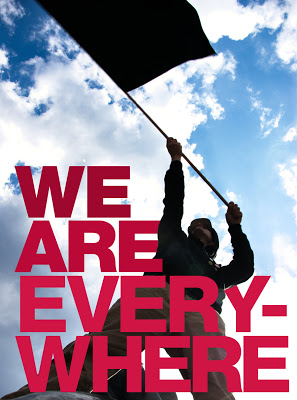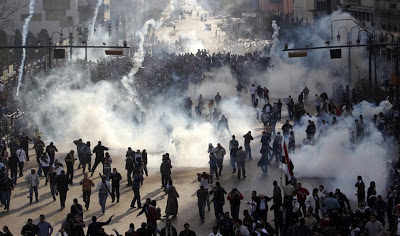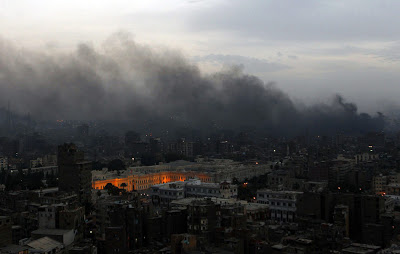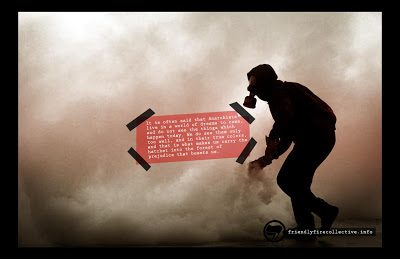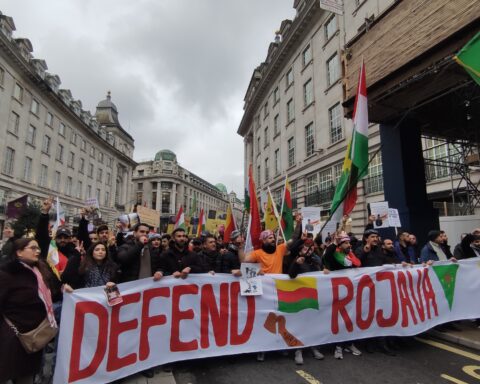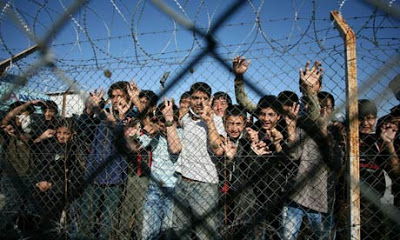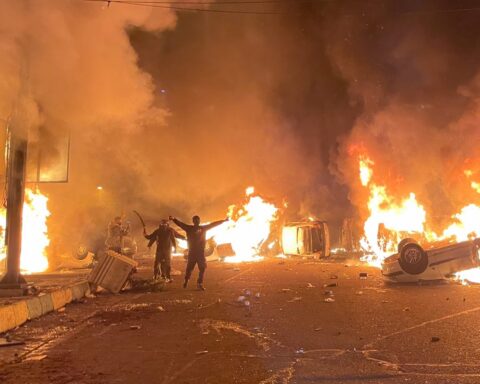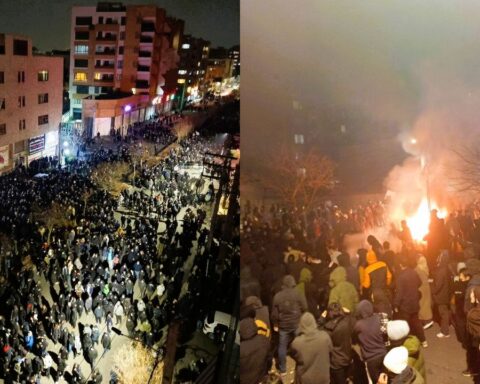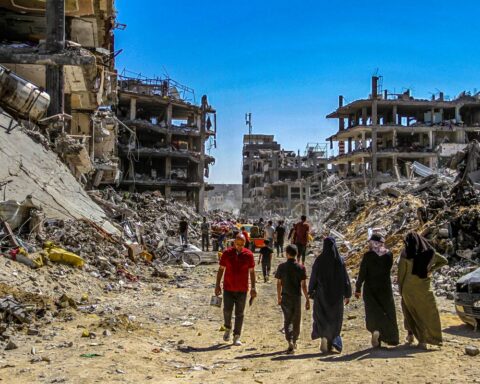North Africa is in revolt. As usual, the most striking thing is how familiar everything is: the young man with the prestigious degree working at a coffee shop, the unemployment and bitterness, the protests set off by police brutality—for police are to the unemployed what bosses are to workers. These details cue us in that what is happening in Egypt is not part of another world, but very much part of our own. There are no exotic overseas revolutions in the 21st century. Make no mistake—though these events dwarf the riots in Greece and the student movement in England, they spring from the same source.
To keep up with events, we urge you to read our comrades’ dispatches from Egypt and anti-authoritarian perspectives from the Middle East in general. But for these uprisings to offer any hope, we have to understand ourselves as part of them, and think and act accordingly. To that end, we’ve solicited this analysis from a comrade in North Africa.
The Revolution in Egypt:
The End of the New Pharaohs?
What is happening—first in Tunisia and now in Egypt—is the beginning of the wave of full-scale revolutions that will inevitably follow the global financial crisis of 2008. Taking place in the wake of the failed “War on Terror,” these revolutions combine the latent force of massive numbers of unemployed youth with the dynamism of modern communication networks. They signal the conclusion of the decade of counter-revolution that followed September 11, 2001. Although they continue the exploration of new technologies and decentralized forms of organization initiated by the anti-globalization movement, the form and scale of these new revolutions is unprecedented. Largely anonymous groups are using the ubiquitous World Wide Web to spark leaderless rebellions against the pharaohs of the global empire of capital.
The self-styled rulers of the world are truly at a loss as to how to understand the new social and technological forces at play; the aging dictator Mubarak is a perfect example of this, but he is hardly the only one of his kind. One can almost smell the fear, not only amongst the despots of China and Saudi Arabia but also the supposed leaders of representative democracies. The contortions the US government has been going through are the most grotesque of all; it isn’t lost on the Egyptian people that the bullets striking down their comrades came from the USA. Egypt receives $1.3 billion dollars of military aid from the US every year. The suppression of “democracy” in the Middle East has been a deliberate policy of the US government: they know popular sentiment would never support their agenda as the military enforcement of global capitalism.
The best efforts of Mubarak’s dying regime to put its fingers in the ears of the world have not silenced the people on the streets of Cairo. Even blocking cell phones and trying to turn off the entire Internet have proved futile. For generations, Arabs and Africans have been silenced, represented by various colonial governments and portrayed as “primitive” and “terrorist” in Europe and the US. Now the people of Egypt are speaking in thunderous unison for freedom—not for political Islam, as demagogues from Iran to Israel would have the world believe. In doing so, they are realizing the ideals to which the US government pays only hypocritical lip service.
Today, the common condition from Egypt to Tunisia is approaching universal unemployment—especially among the younger generations, which comprise the vast majority of population. This is increasingly the case in the United States and Europe as well. Unemployment is no accident, but the inevitable result of the last thirty years of capitalism. Capitalism reached its internal limits at the end of the 1970s; now the factories of every industry produce ever more commodities, while increasing automation renders workers less and less necessary. The only way to make profits off these commodities is to eliminate workers or pay them next to nothing. To discipline the skyrocketing unemployed population and prevent revolt, the police wage a never-ending war on the population. We live in a world overflowing with cheap shit, in which human life is the cheapest of all.
In these conditions, people have nothing to left to lose. Nothing, that is, but their dignity—and it turns out they will not surrender that. It was precisely this innermost core of dignity that led Mohammed Bouazizi to light himself on fire rather than face humiliation at the hands of the police, who in seizing his fruit-selling cart took away the only way he could feed his family. The blaze lit by Mohammed Bouazizi has spread, carried by other unemployed people who thereby transform themselves from abject beggars into world-historical heroes. The people of Egypt are not only burning police cars, they are organizing popular committees to clean the police and other trash off the street, and the streets of Cairo have never felt safer.
It is not surprising that a wave of revolutions should begin now. Not since the days of pharaohs and monarchs has the world been controlled by as senseless a force as the global financial market. As capitalists became less and less able to produce profit from industrial production over the past decades, they had to invent means of profiting based on expected future returns. But in a world of increasingly cheap commodities and poor consumers, how could capitalists keep people buying stuff and still make a profit? They had to invent a way for consumers to continue buying even when they weren’t paid living wages: thus the invention of mass debt. When the sale of real goods can no longer produce profit, profits must be made on increasingly fantastic expected future returns—in other words, on finance.
Yet like any house of cards, debt cannot be built up forever. Eventually, someone wants to be paid back—and so the entire house of cards collapsed under its own weight in 2008. The financial crisis signals a deeper metaphysical crisis of our present order: capitalism is unable to provide for the real material needs of the global population. The high poverty rates in Egypt are not simply the result of mismanagement by Mubarak, but the inevitable consequence of the contradictions of our era.
Their eyes hopelessly clouded by their own ideology and lack of vision, heads of state can only stand dumb and surprised as the crisis goes on and on. They lamely hope to re-start the financial markets through “austerity” or “green” capitalism, refusing to consider systemic change despite the fact that the system cannot even deliver jobs and affordable commodities to people—much less a good life. Just as it took an era of revolution to overthrow the divine right of kings, it will take new revolutions to overthrow the divine right of things: the power of financial capital and its puppet dictators.
Revolutions are never brought about by technology, but rather by the collective action of human beings who radically transform their relationships with each other and the world they share. However, one cannot deny what an important role the World Wide Web has played in Egypt and Tunisia. Especially among cybernetically skilled and predominantly unemployed youth, it enabled people to call for and participate in mass mobilizations without any need of leaders. The demonstrations in Egypt on January 25 were called for by a Facebook page called “We Are All Khaled Said,” named for a victim of police brutality much like Alexis Grigoropoulos in Greece. The page itself was set up by the anonymous “El-Shaheed”—that is, “martyr” in Arabic. Meanwhile, youth throughout the world are mobilizing as Anonymous; in the battle over Wikileaksactions against the Tunisian government, Anonymous has showed itself to be a potent new international with an awakening political maturity beyond the message boards of 4chan. Demonstrators’ ability to communicate with large numbers of people and react immediately to events via mobile phones, Twitter, and Facebook is swiftly making previous forms of Leftist and industrial-based political organization obsolete, along with other hierarchical formations such as political Islam. and more recently in
This revolutionary use of social media should come as no surprise. In the hands of an elite few, expensive communications technology will naturally be used for self-aggrandizement and consumerism. In the hands of unemployed youth and other excluded classes, this technology can be re-purposed to organize revolution. The Internet is the new global factory floor, and we are seeing its first workers’ councils form—a new kind of collective intelligence that enables people to organize themselves directly without representation.
The blank confusion of global capitalists as to who is “really behind” the mysterious resistance in Egypt and Tunisia is revealing. It’s obvious how desperately US politicians wish they had anyone, such as Mohamad ElBaradei, with whom to negotiate. These revolts are anarchist in form if not content—and even the content is becoming increasingly radical. The absence of any organized group or leader in the early days of the protests speaks volumes: increased information technology has not only destabilized the old Leftist forms of organizing, but also the justifications for having hierarchical government in the first place. When people can communicate, they can organize their own lives. Expanding such horizontal structures to a global scale no longer seems impossible, even if it is not yet well thought out.
To make things even worse for capitalists and nation-states, the massive secret apparatus of the state has been revealed in all its incompetence by sites such as Wikileaks. While Wikileaks had nothing to do with the Egyptian revolution, the cables describing Ben Ali’s pet tiger being fed a luxurious diet while Tunisians starved further stoked the flames in that country. Wikileaks has produced paranoia in the global state apparatus itself, as the state cannot function without the subjugated population believing that it is necessary and according it the right to exercise violent force. Now the empire has no clothes—and its naked corrupt power is disgusting to behold. There is a growing consensus that the state apparatus is an archaic holdover no longer worthy of respect.
The Mubarak regime made the classic mistake of conflating technological structures with the people using them, an error typical of Silicon Valley and certain theorists as well. In a poorly thought-out move, the regime shut down all four ISPs in the country, effectively turning off the Internet. In addition, cell phones have been intermittently blocked before major demonstrations. If anything this only enraged the Egyptian people more. It may even have interrupted their spectatorship—it is easier to watch a demonstration over the Net than to participate—and driven more and more people into the street.
The lesson here is clear: the supposedly decentralized Internet is quite centralized, and while it may be useful, it is a mistake to depend on it as long as it remains in capitalist hands. Yet rulers such as Mubarak face a no-win situation. If they keep communications technologies up and running, these will be used to organize against them—but if they take them down, it will provoke worldwide outrage.
How do you organize without the Net? You might start with existing social institutions; in Egypt, this meant the mosques. The “Days of Wrath,” characterized by street-fighting with the police far more intense than the Greek insurrection of 2008, culminated in the torching of the headquarters of Mubarak’s party. Afterwards, in a brilliant move, the protesters called for people to gather after prayer at mosques—where most Egyptians would be gathered anyway. In this regard, the mosques served the same purpose that social centers and squats did during the Greek insurrection, only for a much greater part of the population.
So while communications technology may be advantageous in the early stages of organizing, a movement must become powerful enough not to need the Internet once it takes to the streets. In Egypt, the revolt actually grew in intensity after the Internet was shut off.
If there is one regard in which the Internet is indispensable, it is in spreading the news of disorder elsewhere. As the Empire’s power has become increasingly spectacular, it has become more vulnerable to being damaged on the terrain of the spectacular. Obama’s first response to the uprising was to call for the “violence” to cease—even though his government routinely administers violence in Pakistan and Afghanistan and inflicts it on US citizens through the world’s largest prison system. He and Mubarak are not against violence, but they appear to be afraid of images of violence. If these images escape, they undermine the state’s cover story about maintaining order.
At the same time, the state desperately needs people to distrust and fear each other. This explains why Mubarak released undercover police in civilian uniforms to pose as looters in order to justify his crackdown. When that failed, he turned off the Internet and denied media access in order to prepare the conditions for the kind of massacre it would take to restore his control. Yet now it seems doubtful that the army is willing to carry out such a massacre.
The insurrection that began by burning down police stations then shifted to massive peaceful demonstrations intended to win over the army. Pamphlets that have circulated indicate that Egyptian organizers planned from the beginning to pit the army against the police. Insurrectionists in Europe and the USA should take note of this clever strategic move. After the front line of the party of order was effectively defeated, the Egyptians clearly understood that the only force capable of stopping them was the army. Instead of attacking it directly, which would surely have resulted in a massacre, they undertook to win over the hearts and minds of the soldiers. Thus far they have been successful in this, demonstrating that they can self-organize and maintain a leaderless yet disciplined rebellion that makes the streets of Cairo safe and clean for the first time in years.
This leaves the army without a reason for existence, let alone any excuse for a massacre. Once an insurrection has reached a certain phase, as a friend has said, weapons are unnecessary. For a revolution to succeed in overthrowing the state, the army must refuse to shoot its own people and instead join them in revolt. In Egypt, the army is at least paralyzed enough right now not to start shooting; it may yet join the people, or more likely attempt to broker a transition to representative democracy.
All this shows that billions of dollars of military equipment can’t stop a revolution. Once things reach a certain point, military force is no longer the determinant factor. If the Egyptian people persist in revolt, the military can hardly bomb its own cities.
Yet even if a military defeat is avoided, the insurrectionary process begun on the “Days of Wrath” is more likely to be side-tracked into representative democracy than to end in a genuine communization of society—that is, in the immediate sharing of all production for the survival of the people. This is not to be pessimistic—already the neighborhood assemblies and defense committees resemble nothing more than the Paris Commune. But Mubarak is a dictator, and the youth of Egypt have not yet tasted the bitter fruits of representative democracy. They may have to learn about them the hard way. Even if a representative democracy is established, it will not be the end of the story—witness the continuing protests in Tunisia. There would inevitably be another insurrection sooner or later, although that could take years or decades.
In this context, it is promising that many young Egyptians seem aware that representative democracy will only limit their movement and redirect into yet another form of enslavement. This is visible in many ways—for example, in the message sent to self-appointed leaders like ElBaradei, “Shall we just call your mobile when we have finished the revolution for you?” The insurrection has also seen unparalleled action and power of the Egyptian women, who will not go back to being subservient under the Muslim Brotherhood after these upheavals.
Yet the popular occupation of Tahir Square cannot last forever; there must come a moment when food will be produced, train lines reactivated, and the Internet turned back on. These are the real keys to the success of the insurrection and to preventing the return to capitalism, even under the mantle of representative democracy. It seems that the steps in this direction have not yet begun.
Let’s step back now and ask larger questions. If Egypt is not fundamentally different from Europe and the US, why haven’t such insurrections happened there as well? First, let us not be too hasty—the dominos are already falling, with massive protests in the streets of Jordan, Algeria, Yemen, and Mauritania. One reason the insurrection has such popular power in Egypt is that, as many Arabic-speaking countries, the Egyptian form of life has not yet been fully subsumed into capitalism. For example, in many cases one only pays as much as “one feels” one should pay for goods. Haggling is not so much a way to maximize micro-profits as to ascertain an affordable and ethical price for an exchange. The commodity exchange itself is often less important than the social relationships that the commodity symbolizes. The collective responsibility and power of the family knits people together over generations, in contrast to the alienated individuals of the United States and most of Europe. The vibrant and public street life of the Middle East is a natural fomenting ground for insurrection.
Yet are there not dark forces waiting in the wings? This seems unlikely, as the protest is clearly focused on “freedom” rather than Islam, with those wanting to lead religious chants being shouted down on occasion. This is not to say that Egyptians are not Islamic—indeed they are—yet there are subtle distinctions. Political Islam is effectively the Tea Party of Egypt, a hierarchical religious movement mostly of the older and conservative generation; but Islam exists in other variants, binding social relationships and promoting a collective ethics. One can even interpret the giving of alms in Islam as a ritual to avoid excessive centralization of wealth. “Allah” does not necessarily denote a commanding deity; the notion may also point to the ineffable, the invisible excess of life that denies reduction and resists the catastrophic harnessing of all to the imperatives of profit.
Of course, currents far older than Islam hold sway in Egypt as well. Unlike many in Europe and America, many Egyptians are profoundly aware of their history from antiquity onwards, and feel deep shame at their present state of impoverishment. The dignity and respect they show each other in the streets in midst of the insurrection attests that this revolution is not abstract, but rooted in everyday lives; it is the deep metaphysics of these forms of life that provide the subjective conditions for transformation.
Communism is older than Marx, just as anarchy is older than Proudhon. The age of revolutions did not begin with the Paris Commune, nor did it end with the fall of the Berlin Wall. As capitalism now encircles the earth, the one thing that could unite the world would be a common rejection of it and the police that defend it. The communism of Marx was trapped in the abstract metaphysics of economics and poisoned by a misunderstanding of the danger posed by the state; this sabotaged the revolutions of the early 20th century, bringing about the catastrophe of Soviet-era state capitalism.
But the age of revolutions is not over; on the contrary. In a song of the Tuareg—“the desert is our mother, and we will not sell her”—we can glimpse a form of communism far more alien and hostile to capital than anything imagined by Lenin. Many of the calls for “freedom” in Egypt have little to do with the freedom to elect a president or choose among commodities on the market, but resonate with a common desire to live with their heads high and not cowed to any ruler. For this they are ready to die, whether by self-immolation or in the streets together.
Yet one can sense a profound need at this time for a common international revolutionary purpose that resonates outside of the Middle East, for something truly universal to fill the void left by capitalism. The nationalist flags of the protesters were tactically effective at confusing the army, but they also reflect a lack of critique of the conceptual apparatus of capital and the state. While the conditions are right for revolution, over the last thirty years revolutionaries have largely failed to create and spread the organization and analysis necessary for insurrections to become genuine anti-capitalist revolutions. What does it take for people to realize that the true potential of their neighborhood defense committees is not as a means of temporarily replacing the police, but of prefiguring the abolition of all police, in every country?
No event occurs in a vacuum; events originate in concrete conditions, and consequently they tend to come in waves. The events in Egypt show that the center of revolutionary impetus is no longer “the West”; this new age of revolution will culminate first in areas where the living conditions are becoming unbearable and the ways of life are not yet completely colonized by capital. However, it would be a mistake to see this as merely the conclusion of an unfinished anti-colonial revolt. It is something much bigger and deeper. The financial crisis is a sign that capitalism is on a declining trajectory. The conditions that precipitated the events in Egypt are rapidly becoming universal across the globe, spelling another cycle of revolution and possibly war. Eventually these same forces will hit Saudi Arabia, Europe, China, and finally even the United States with the strength of a tidal wave.
Make no mistake about it, we are entering an era of revolt. These revolts will reject and attack capitalism in their concrete practice, even if the systematic destruction of earlier revolutionary currents has left a vacuum. Hopefully the participants will realize that freedom is impossible without the destruction of capitalism and the state, and a new generation of revolutionary thought will update the concept of revolution for the dawning era. We are at a point now where it should become clear to all that we can direct our own lives—that the state is a historical fossil holding us back. As shown in Egypt, the stranglehold of the state and capitalism must be broken in the streets; over the coming decades the results of this ultimate struggle will likely decide the fate of humanity itself.
All Power to the People!
-A dissident exiled in North Africa
with assistance from the CrimethInc. Workers’ Collective
with assistance from the CrimethInc. Workers’ Collective
